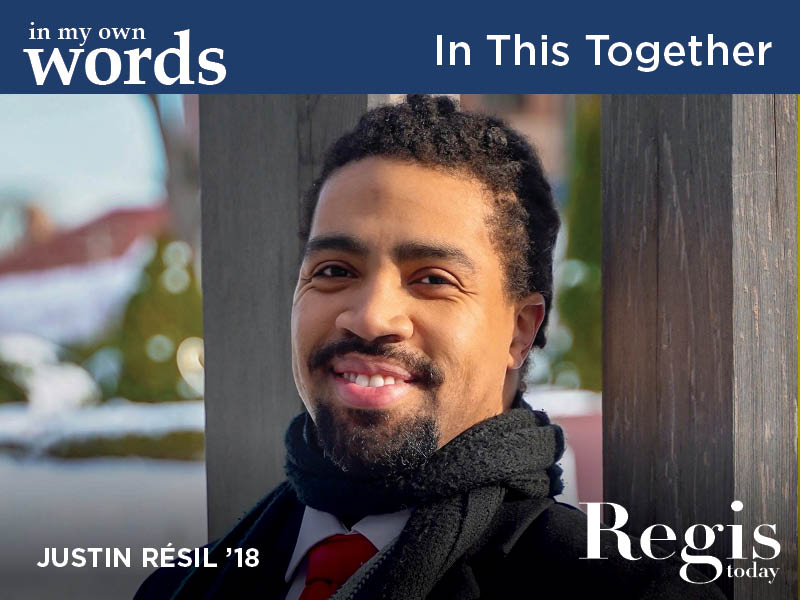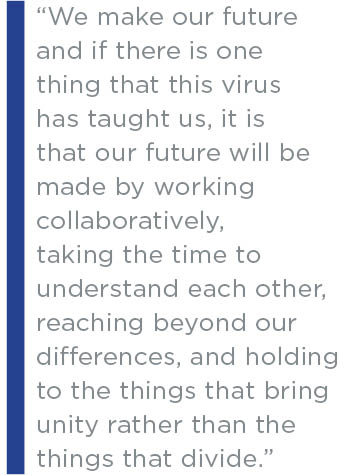
BY JUSTIN RESIL '18
Justin Résil, FNP-BC, APRN, CME, TNCC, ENPC ’18, began his undergraduate journey at Pensacola Christian College in Florida as a studio art major—but ended up changing paths and graduating with a degree in biology in 2013. Soon after, he enrolled at Regis in the accelerated Bachelor of Science in Nursing to Master of Science in Nursing program with a concentration in family practice. Now he is a family nurse practitioner at his family’s clinic, Résil Medical Associates, as well as a volunteer at the Boston Hope Center. Here, Résil shares his experiences—personal and professional—as a nurse during the COVID-19 pandemic.
We all have a story about how our individual worlds changed in similar and dissimilar ways during the COVID-19 pandemic. Given that the virus originated in Wuhan, China, many questions and concerns arose among clinicians and lay people alike regarding the virulence of the disease. I

commonly engage with patients of color. In many circumstances, these patients, especially Black patients, are the ones most affected by illness and disease due to a multitude of factors—including inadequate funding, lower levels of education, and inability to access the health care system due to area of habitation, lack of transportation, and lack of significant health insurance. Because I work with clients who immigrated to the United States, there is also a language barrier. Many of my clients had questions and some did not understand the severity of the pandemic, as several of the major news outlets were delivering the stories in English. As their health care provider, it fell to me and my co-clinicians to address the knowledge deficits that our patients possessed.
But this virus has not limited itself to affecting my professional life; my personal life also changed. I was unable to attend my church, which I view as an extension of my family. My mother has health issues that make her more at-risk for a violent reaction to the virus, and I had to enact a quasi-quarantine from her. I have a cousin and an aunt who contracted the virus—and although they quickly recovered, I lost an uncle to COVID-19 and nearly lost another who remained in the intensive care unit for several weeks before slowly recovering. This virus has no qualms about who it takes, nor the devastation it has left in its path.
PROVIDING HOPE
As the pandemic extended into March and April, I felt the need to take a more active role, so I began looking for emergency sites that needed aid. I found a commission by the Boston Hope Center that was looking for local medical providers and health care professionals to help assist and treat homeless patients in the Greater Boston area who had been affected by the virus. During my first floor meeting, I had a chance encounter. I looked across at another teammate whose voice sounded familiar, but given that all the workers were in full PPE (personal protective equipment) with N95 face masks, facial barriers, gloves, and hazmat suits, it was difficult to identify who anyone was. I looked at the clinician’s name tag and saw that her name was Ana. When I asked her to confirm her last name, she was startled but inquisitively replied “Yes.”
I realized that Ana was my former classmate from Regis. Both of us were overjoyed to have met up again after not seeing each other in more than two years. Together we addressed the needs of hundreds of patients that not only included the short-term treatment of COVID-related symptoms, but also the mental health and social issues that were affecting our patients. Despite our best efforts, one of our patients had no place to go after discharge from the facility. Another patient was able to get clean from IV drug use but was afraid to leave the center and be on his own. Collaboratively, the team endeavored to acquire accommodations for him and we were able to enter him into a drug recovery program.
STAYING UNITED
As this crisis continues to unfold, it will fall on nurses to continue to reach out to their communities. We must address the deficiencies in knowledge with evidence-based practice. We must continue to advocate for the needs of our patients, our coworkers, and ourselves. The long-term impacts of this virus are far-reaching and it will likely take years to fully surmise the extent to which it has affected humanity on this planet. Nevertheless, we must never shy away from our responsibilities. We make our future and if there is one thing that this virus has taught us it is that our future will be made by working collaboratively, taking the time to understand each other, reaching beyond our differences, and holding to the things that bring unity rather than the things that divide.
I end with this quote from Dr. Leo Buscaglia: “Too often we underestimate the power of a touch, a smile, a kind word, a listening ear, an honest accomplishment, or the smallest act of caring, all of which have the potential to turn a life around.” (Nurseslabs.com)
Let this never be said of us. We are the world, and we are in this together.